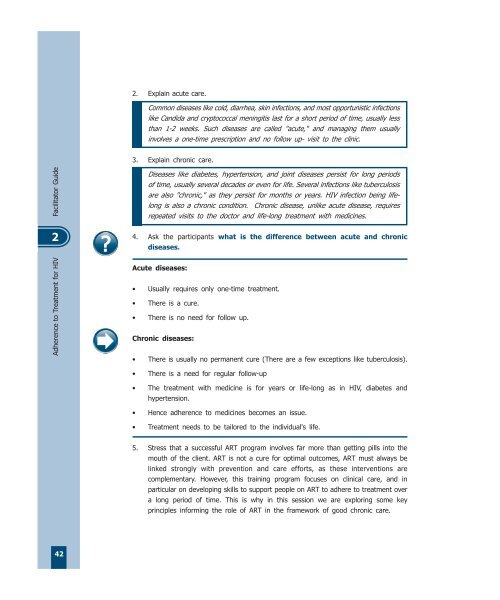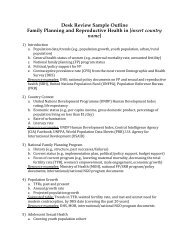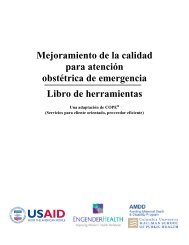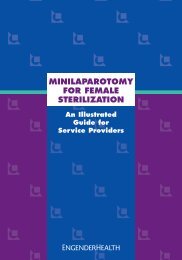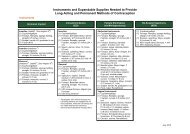Facilitator Guide - EngenderHealth
Facilitator Guide - EngenderHealth
Facilitator Guide - EngenderHealth
- No tags were found...
You also want an ePaper? Increase the reach of your titles
YUMPU automatically turns print PDFs into web optimized ePapers that Google loves.
2. Explain acute care.Common diseases like cold, diarrhea, skin infections, and most opportunistic infectionslike Candida and cryptococcal meningitis last for a short period of time, usually lessthan 1-2 weeks. Such diseases are called "acute," and managing them usuallyinvolves a one-time prescription and no follow up- visit to the clinic.3. Explain chronic care.<strong>Facilitator</strong> <strong>Guide</strong>2Adherence to Treatment for HIVDiseases like diabetes, hypertension, and joint diseases persist for long periodsof time, usually several decades or even for life. Several infections like tuberculosisare also "chronic," as they persist for months or years. HIV infection being lifelongis also a chronic condition. Chronic disease, unlike acute disease, requiresrepeated visits to the doctor and life-long treatment with medicines.4. Ask the participants what is the difference between acute and chronicdiseases.Acute diseases:• Usually requires only one-time treatment.• There is a cure.• There is no need for follow up.Chronic diseases:• There is usually no permanent cure (There are a few exceptions like tuberculosis).• There is a need for regular follow-up• The treatment with medicine is for years or life-long as in HIV, diabetes andhypertension.• Hence adherence to medicines becomes an issue.• Treatment needs to be tailored to the individual's life.5. Stress that a successful ART program involves far more than getting pills into themouth of the client. ART is not a cure for optimal outcomes, ART must always belinked strongly with prevention and care efforts, as these interventions arecomplementary. However, this training program focuses on clinical care, and inparticular on developing skills to support people on ART to adhere to treatment overa long period of time. This is why in this session we are exploring some keyprinciples informing the role of ART in the framework of good chronic care.42


